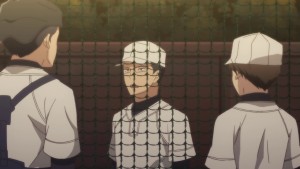 In hindsight, it seems Battery was very much the sort of sports anime that naturally fits into the NoitaminA timeslot (not that it means as much as it used to). I didn’t know much about the source novels, but given the production details and the attachment of Mochizuki Tomomi as director it was always a good bet that there was going to be some sort of askew take on the genre here – it was only a question of what that take was. Like Ping Pong, this is a sports anime where the sport is very much a major focus, but more as a crucible than as a central theme in itself.
In hindsight, it seems Battery was very much the sort of sports anime that naturally fits into the NoitaminA timeslot (not that it means as much as it used to). I didn’t know much about the source novels, but given the production details and the attachment of Mochizuki Tomomi as director it was always a good bet that there was going to be some sort of askew take on the genre here – it was only a question of what that take was. Like Ping Pong, this is a sports anime where the sport is very much a major focus, but more as a crucible than as a central theme in itself.
 Well, after five episodes it’s now pretty clear what Battery is. It’s a series about a boy, and about baseball. But more than either of those things this is a story about Japan – more specifically, the peculiar social structures that rigidly govern it and the enormous pressure placed on the Japanese to honor them. It would be hard to find a setting where those elements are more starkly in focus than youth baseball, so this is a natural canvas on which Asano Atsuko and Mochizuki-sensei can paint their social critique. Just because most baseball manga and anime (even the good ones) mostly ignore this side of the sport doesn’t mean it’s not a story that’s begging to be told.
Well, after five episodes it’s now pretty clear what Battery is. It’s a series about a boy, and about baseball. But more than either of those things this is a story about Japan – more specifically, the peculiar social structures that rigidly govern it and the enormous pressure placed on the Japanese to honor them. It would be hard to find a setting where those elements are more starkly in focus than youth baseball, so this is a natural canvas on which Asano Atsuko and Mochizuki-sensei can paint their social critique. Just because most baseball manga and anime (even the good ones) mostly ignore this side of the sport doesn’t mean it’s not a story that’s begging to be told.
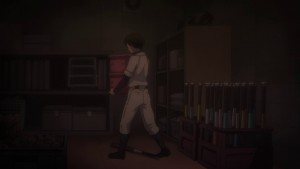 That the rather horrifying events in the first part of this episode are presented with such clinical detachment by Mochizuki only adds to their discomfort level – and that’s very much in-character for the director. We’ve already seen the struggle of Takumi to adapt to the inflexibility and joylessness of middle-school baseball (it gets even worse in high school), and frankly life in general. Sure, Takumi comes off as kind of a jerk sometimes (most of the time, even) – I wouldn’t deny that. But the point is that Japan is a society that strongly frowns on individualism, on standing out – especially among children. Much of getting by in school (and afterwards, too) amounts to just accepting things without needing to know (or agree with) the reason behind them. Is the fact that Takumi finds that is so illogical such a terrible thing?
That the rather horrifying events in the first part of this episode are presented with such clinical detachment by Mochizuki only adds to their discomfort level – and that’s very much in-character for the director. We’ve already seen the struggle of Takumi to adapt to the inflexibility and joylessness of middle-school baseball (it gets even worse in high school), and frankly life in general. Sure, Takumi comes off as kind of a jerk sometimes (most of the time, even) – I wouldn’t deny that. But the point is that Japan is a society that strongly frowns on individualism, on standing out – especially among children. Much of getting by in school (and afterwards, too) amounts to just accepting things without needing to know (or agree with) the reason behind them. Is the fact that Takumi finds that is so illogical such a terrible thing?
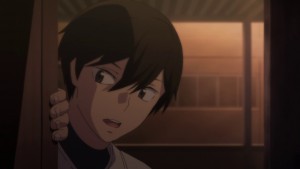 Now, we see another ugly side to Japanese society, especially its approach to child-rearing. Not so much the bullying by Nobunishi and his flunkies, as horrifying as that was – bullying is a huge problem in Japan (most egregiously in middle schools) but it’s certainly not limited to Japan. No, this episode was really much more about what happens after the bullying than the bullying (which was predictable) itself. There’s the matter, first, of what to do about it – especially for poor Sawaguchi, who got caught up in it by being in the wrong place at the wrong time. The pressure is on the boys to keep the story to themselves because of potential implications for the team – and in fact that seems very likely to be what’s going to happen, until Sawaguchi’s conscience gets the better of him and he spills the beans.
Now, we see another ugly side to Japanese society, especially its approach to child-rearing. Not so much the bullying by Nobunishi and his flunkies, as horrifying as that was – bullying is a huge problem in Japan (most egregiously in middle schools) but it’s certainly not limited to Japan. No, this episode was really much more about what happens after the bullying than the bullying (which was predictable) itself. There’s the matter, first, of what to do about it – especially for poor Sawaguchi, who got caught up in it by being in the wrong place at the wrong time. The pressure is on the boys to keep the story to themselves because of potential implications for the team – and in fact that seems very likely to be what’s going to happen, until Sawaguchi’s conscience gets the better of him and he spills the beans.
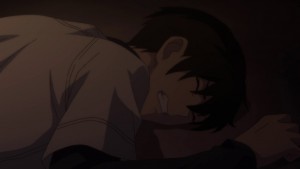 First of all, it’s unconscionable that the boys should have had to feel that way – and in fact they’re right, because they understand the system well enough to know what’s likely to happen if the truth gets out. And once it does, we see a quintessentially Japanese response from the school and the principal. Their primary concern is not justice for the victim and the perpetrators – it’s minimizing embarrassment for the school, and long-term harm to the criminal, Nobunishi (who has the temerity to urge the coach not to “betray” him). Part of this is no doubt because on a certain level, the principal sees what Nobunishi did as justifiable – the hierarchy of Japanese life more or less makes the kouhai the property of the sempai (or the child of the parent, and that in the eyes of the law as well) to do with as they please. In the principal’s eyes the problem here isn’t so much what Nobunishi did to Takumi – it’s that Sawaguchi turned it into a public issue.
First of all, it’s unconscionable that the boys should have had to feel that way – and in fact they’re right, because they understand the system well enough to know what’s likely to happen if the truth gets out. And once it does, we see a quintessentially Japanese response from the school and the principal. Their primary concern is not justice for the victim and the perpetrators – it’s minimizing embarrassment for the school, and long-term harm to the criminal, Nobunishi (who has the temerity to urge the coach not to “betray” him). Part of this is no doubt because on a certain level, the principal sees what Nobunishi did as justifiable – the hierarchy of Japanese life more or less makes the kouhai the property of the sempai (or the child of the parent, and that in the eyes of the law as well) to do with as they please. In the principal’s eyes the problem here isn’t so much what Nobunishi did to Takumi – it’s that Sawaguchi turned it into a public issue.
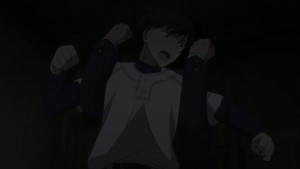 The practical import of this is that the school effectively punishes the baseball team in order to try and save itself and Nobunishi from permanent harm. That means an indefinite suspension of practice and likely withdrawal from the tournament whose first game Tomura has already declared Takumi is to start. Takumi takes matters into his own hands and decides the first-years will practice anyway, more or less dragging the reluctant Kaionji (who had nothing to do with the attack on Takumi) along for the moment. But it’s hard to imagine the school will let that stand, and it seems that we’re headed towards another inevitable confrontation.
The practical import of this is that the school effectively punishes the baseball team in order to try and save itself and Nobunishi from permanent harm. That means an indefinite suspension of practice and likely withdrawal from the tournament whose first game Tomura has already declared Takumi is to start. Takumi takes matters into his own hands and decides the first-years will practice anyway, more or less dragging the reluctant Kaionji (who had nothing to do with the attack on Takumi) along for the moment. But it’s hard to imagine the school will let that stand, and it seems that we’re headed towards another inevitable confrontation.
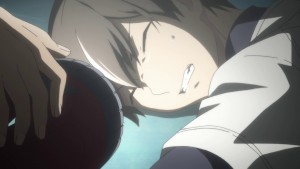 It’s innocuous in its demeanor, but make no mistake – Battery is putting the more unsavory elements of Japanese society and its education system on trial here, and that’s a fascinating thing to watch play out. In a culture that zealously adheres to the idea that the needs of the many outweigh the needs of the few or the one, an individual like Takumi is an irritant at best and a genuine threat at worst. And that baseball is a child’s game that should give a certain joy to those playing it – especially children – is simply not a notion that’s widely accepted. I love pure baseball stories like Major and baseball-themed character dramas like Cross Game as much (in fact a lot more) that most, but a series like Battery is, in my view, long overdue. These are questions that need to be asked, and Mochizuki Tomomi is certainly someone I’m glad to have asking them.
It’s innocuous in its demeanor, but make no mistake – Battery is putting the more unsavory elements of Japanese society and its education system on trial here, and that’s a fascinating thing to watch play out. In a culture that zealously adheres to the idea that the needs of the many outweigh the needs of the few or the one, an individual like Takumi is an irritant at best and a genuine threat at worst. And that baseball is a child’s game that should give a certain joy to those playing it – especially children – is simply not a notion that’s widely accepted. I love pure baseball stories like Major and baseball-themed character dramas like Cross Game as much (in fact a lot more) that most, but a series like Battery is, in my view, long overdue. These are questions that need to be asked, and Mochizuki Tomomi is certainly someone I’m glad to have asking them.



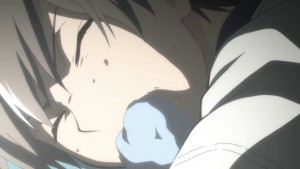
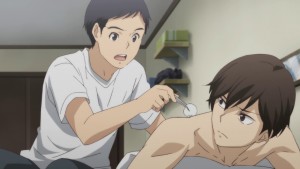
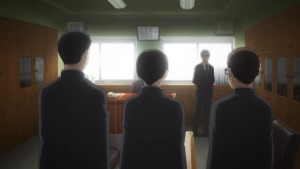
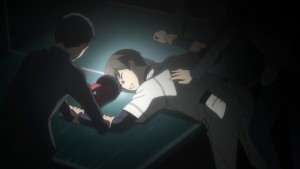
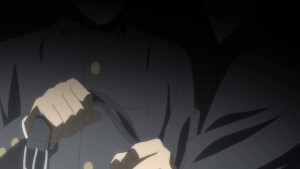
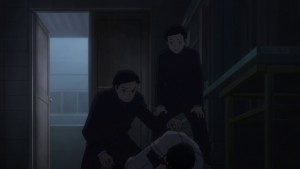
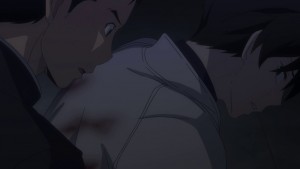
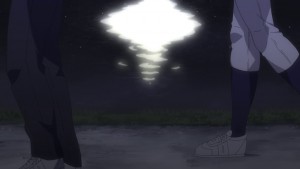
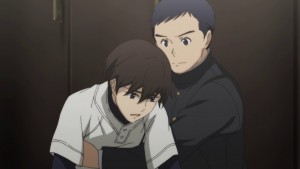
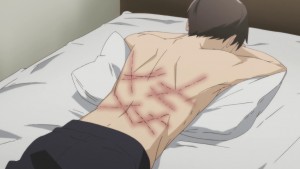
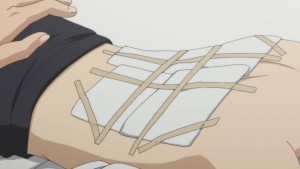
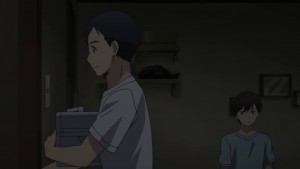


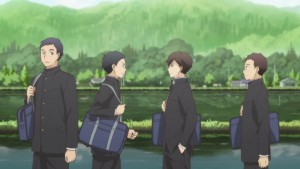

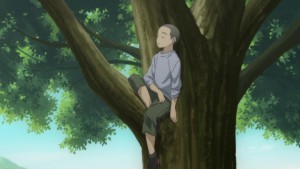
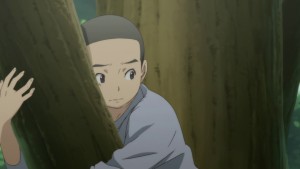
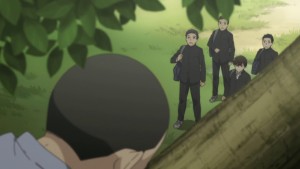

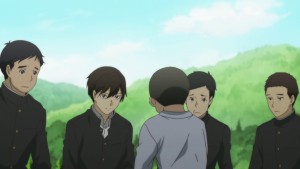
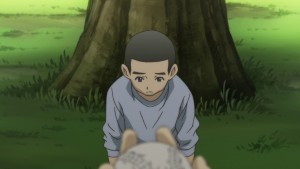
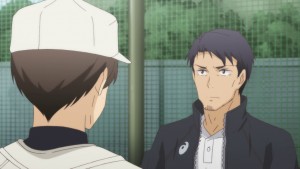
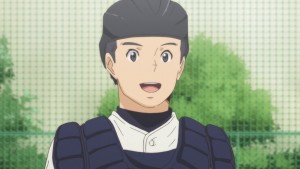
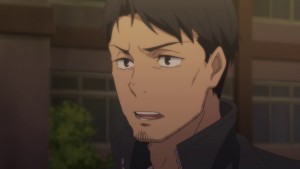
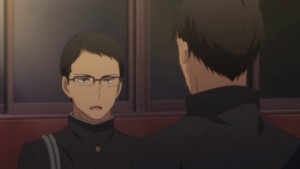
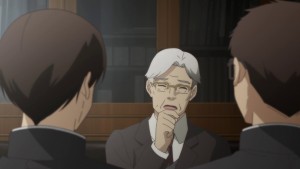
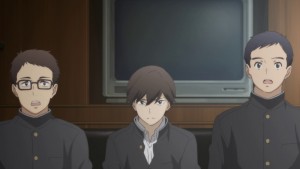



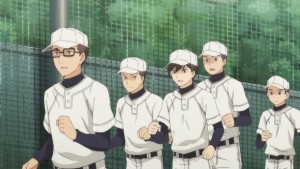
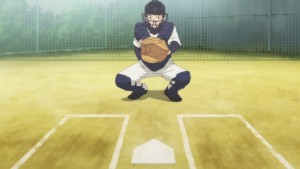


Color2413
August 12, 2016 at 1:04 amDo far this is probably my favorite series of the season (I prefer it to the flashier-but-tries-to-hard-to-be-ingratiating Mob Psycho) because of the lack of cliche characters and deep character development. It’s just not a sports anime; it’s a fine, engaging drama. And it has great depiction of atmosphere.
After the relative small amount of drama in the first episodes, this one really packed a punch with some shocking violence, very out of character for sports anime in general. But as GE pointed out, “generic sports anime” is this antithesis of Battery is trying to do,
I loved Asano’s other well-known work, No. 6, particularity the novel version that preceded the anime. I think that Battery has enormous potential.
sarasva
August 12, 2016 at 8:54 amEnzo, thanks for putting this episode in the context of Japanese culture, or more accurately, putting all of Battery into perspective. Since Battery is becoming a social critique, it helps a lot to understand the context of what Battery is critiquing, so kudos to you.
And I’m glad this production team has been superb and courageously unconventional at handling the material thus far because this is sensitive stuff.
I also appreciate how age-appropriate these boys are acting despite my initial doubts – they still have a somewhat childlike mentality. Sawaguchi straight up admitting he was afraid of the dark and hugging the tree in fear and confusion when confronted by his friends. The boys still playing baseball because they want to, rules be damned. Even, arguably, Nobunishi’s lashing out, which to me sounds like “I’m not wrong! YOU made me do it! Not my fault!”
Ah, the glory of youth. Did anybody say it was gonna be easy?
(Although, both Seiha and Gou are very mature and observant of others for their age…)
Earthling Zing
August 12, 2016 at 10:21 amThis show has my attention from start to finish every episode and I love how it depicts modern society as a place with some really suffocating values.
15FAN
August 14, 2016 at 11:47 pmWe have the same thing in the US I dont get the fixation that it this was a Japanese problem ! We have probally more incidemts in the US Just recently In NJ Saryeville HS one of the Top teams every week got in trouble for hazinf new players including sexual assault The Coach got canned / the season cancelled and chrages brought against some Many more all over the country but this was abig story!